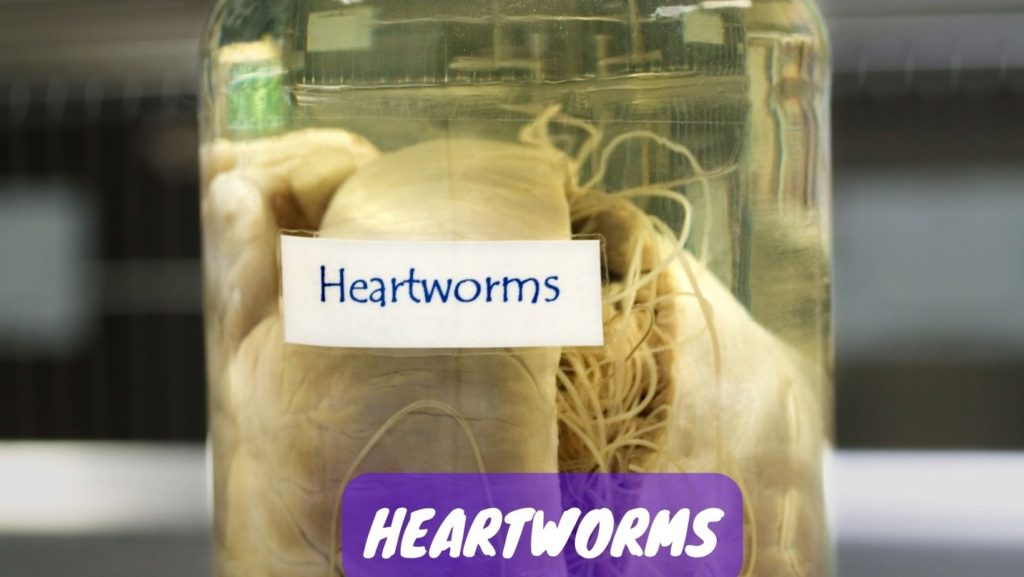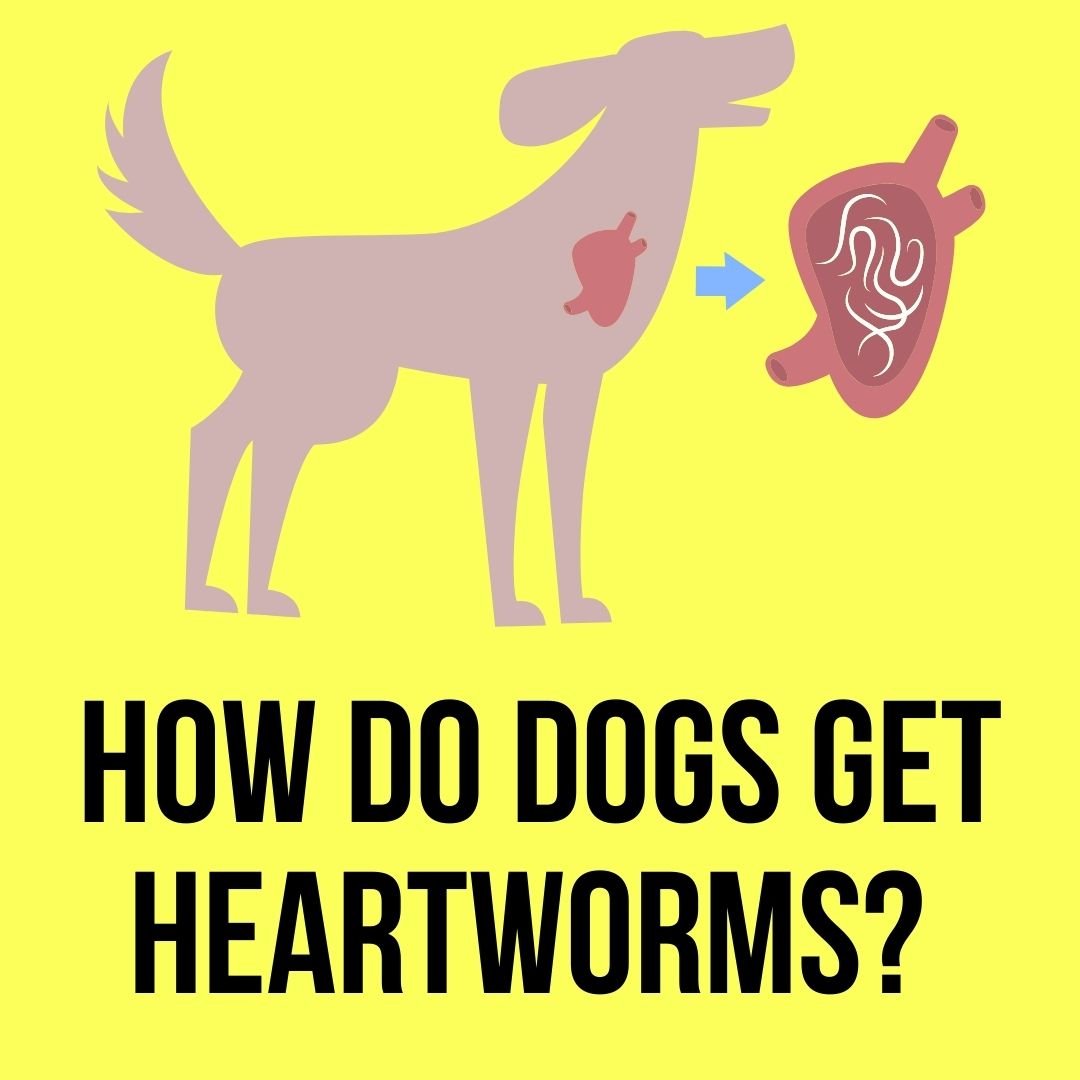Wondering how your well-trained and mannered dog got Heartworms?
Every pet parent wants their dogs to be healthy and happy to the maximum. They make multiple efforts to maintain the dog’s health; however, nothing isn’t in favor at times.
For instance, while you kept your dog away from all gross, he still got a Heartworm infection. This brings pet parents to the confusing question, How can my dog get Heartworms?
Contents
- What causes dogs to have heartworms?
- What are the first signs of heartworms in dogs?
- Heartworms in Dogs – Symptoms, Causes, Treatments
- Heartworm Disease in Dogs- What Causes it?
- Symptoms of Heartworm Disease
- Treatment for Heartworm Infection in Dogs
- Heartworms in Dogs- 10 Facts and Reasons
- How often does a dog get heartworm?
- How much is a heartworm test for dogs?
- How much does it cost to treat heartworms?
- Does heartworm treatment shorten a dog’s life?
- How can a dog get heartworms while on preventative?
- Can a dog fully recover from Heartworms?
- Do dogs poop out heartworms?
- FAQ’S
- Wrapping up…
What causes dogs to have heartworms?
Heartworm infection is a very serious parasitical disease that can have lifelong effects on a dog.
Pets, including dogs and cats, can get heartworm from a total external source without even efforting for the same.
Heartworms or Dirofilaria immitis are parasitic worms that transfer to dogs through mosquito bites. While a mosquito bites an infected animal, it will also suck up a number of microfilariae.
It further transfers to the mosquito’s salivary glands, making them the carriers of Heartworm infection. Further, when the same mosquito bites another dog, it transfers the heartworm larvae.
There is no other way for dogs to get a heartworm infection instead of a ‘Mosquito Bite.’
What are the first signs of heartworms in dogs?
The first signs of heartworms in dogs are often the alarming ones as well.
Dogs often show symptoms of heartworm disease, typically around 6 months post-implantation when the worm reaches maturity. It by then spreads well inside the dog’s body, making the infection close to severe.
During the early stage of heartworm infection, dogs generally show no to very mild symptoms.
The symptoms apparently develop and become more evident once the infection is spread all across the body.
And once you start observing them, it is the time to take quick action without even wasting a day.
Here are the first signs of heartworms in dogs. Once you observe them, avoid being slow as it can bring life-threatening risks for your dog.
1) Dry, Unproductive, and Persistent cough:
A heartworm infection that is now spread in the lungs as well can cause a dry and persistent cough. It is unlike the usual kennel cough, which is strong and sporadic.
The suffering dog may begin coughing after even a light exercise session. The condition will eventually get worst, making the dog faint from coughing. In the worst cases, the condition can also cause blockage in the lungs.
2) Shallow and Rapid Breathing:
If the Heartworm infection has reached your dog’s lungs, more respiratory problems will start to occur.
Due to the dry and persistent cough, the area near blood vessels in the lungs will start retaining fluid.
This condition will make it harder for the dog to receive oxygen making his breath shallow and rapid.
3) Lethargy, Inactivity, and Weight loss:
Another early and prominent sign of heartworm in dogs is lethargy and inactiveness. You may notice your dog being more tired without actually doing any physical work.
Doing even a little physical activity may become strenuous for the dog. Some dogs may also experience severe weight loss as an early sign of Heartworm infection.
Heartworms in Dogs – Symptoms, Causes, Treatments
Heartworm infection in dogs is something every individual must concern about. Whether it is your own house dog or the street dogs lying outside your house, if you suspect them of heartworm infection, consider taking a Vet’s help soon.
Heartworm infection progresses through each stage and becomes more critical. It isn’t like any regular parasitical infection and can even result in death amongst dogs or the infected individual.
That is why it is essential to pay attention to symptoms and consider treating them as soon as possible.

Heartworm Disease in Dogs- What Causes it?
Dirofilaria immitis, a parasitic worm, causes Heartworm Disease in dogs. The worm enter’s dog’s body through a mosquito bite that acts as a larvae injector.
The carrier Mosquitos first feed on an already infected pet and ingest immature heartworm larvae, called microfilariae.
Next, the larvae take 10 to 30 days and develop inside the mosquito’s guts. Later, it enters his mouth, and with each bite, it spreads to a new host.
And since dogs are the definitive hosts of heartworms, their system can make the parasite mate, produce, and mature.
Symptoms of Heartworm Disease
- Dry, Unproductive, and Persistent Cough.
- Lethargy, Inactivity, and Laziness.
- Loss of Appetite and Weight Loss.
- Distended chest.
- Anemia.
- High Blood Pressure.
- Right-Sided Chronic Heart Failure.
- Shallow and rapid breathing.
- Allergic Reactions.
- Collapsing/ Fainting.
- Death in some cases.
Treatment for Heartworm Infection in Dogs
Generally, a simple blood test can diagnose Heartworm infection in Dogs. After that, some Vets even perform some additional tests in order to determine whether the dog can undergo Heartworm treatment or not.
Some of the diagnoses (part of treatment) for heartworm infection include,
- Serological test for antigens to adult heartworms (antigen test, ELISA)- A blood sample test.
- Bloodwork (complete blood cell count, serum biochemistry)- A blood sample test.
- Chest radiographs (X-rays).
The treatment further includes the injection of a medicinal drug. Melarsomine (brand name Immiticide®) is an injectable drug that is known for killing adult heartworms in the heart and adjacent vessels.
The Vet injects this drug with a series of injections within a schedule depending upon the dog’s condition.
Complete rest for dogs is necessary during the drug course and even after a little something. Focusing on a light and easy-to-digest diet is also advisable.
Heartworms in Dogs- 10 Facts and Reasons
Here’s all that you need to know about Heartworms in Dogs.
- Heartworms are transmitted only by Mosquitos. There is no other way of a heartworm infection transmission among animals, animals to humans, and humans to animals. Over 20 species of mosquitoes can carry heartworm larvae and spread it further amongst both humans and animals.
- Heartworm disease is present all across the globe. More animals suffer from heartworm infection, especially in areas where mosquitos are prevalent.
- Symptoms of a Heartworm infection may not appear unless the disease is close to severe. An infected dog may show signs of infection probably after 5 to 6 months of infection.
- Heartworm infection is usually silent until diagnosed.
- It is easier to diagnose heartworm infection in dogs than in cats. For dogs, some basic blood and x-ray tests do the deed. However, for cat’s antibody and antigen tests, an x-ray, an ultrasound, and other tests are essential for diagnosing the problem.
- Heartworm prevention is safe, has results, and is cost-effective. At the same time, the treatment for heartworm infection can cost a lot. It, at times even, may not prove as helpful.
- Heartworm infections can prove fatal. It may affect the heart, lungs, and pulmonary blood vessels of the suffering pet.
- No dogs, cats, other pets, or humans can transfer a heartworm infection directly. The role of mosquitoes as a carrier is highly vital in the process.
- Both indoor and outdoor dogs can catch a heartworm infection.
- The average lifespan of heartworms in untreated dogs is 5 to 7 years.
How often does a dog get heartworm?
Dogs can get Heartworms once or twice a year. That is why the American Heartworm Society suggests giving heartworm prevention every 6 to 12 months to dogs.
Since heartworms are spread through mosquitos, summers are more likely the breeding season for such infections.
The Medical market has multiple monthly topical and monthly chewable products for heartworm protection. Along with that, there are several six-month injections as well.
The best way to choose the right heartworm treatment for dogs is through Vet consultancy.
How much is a heartworm test for dogs?
The cost of a heartworm test for dogs can cost differently depending upon the dog’s size, Vet, and stage of infection.
| Infection Stage | Approx Cost |
| A Regular heartworm test | Approximately $20 to $75. |
| Infection stage, X-rays | Cost between $125 to $200. |
| An Echocardiogram | Costs anywhere $500 to $1,000 |
How much does it cost to treat heartworms?
The cost of heartworm treatment in dogs is very high.
If your dog is suffering from a heartworm infection, you can expect to spend roughly $500 to $1300 dollars.
This estimate includes every step from the diagnosis to treatment and aftercare.
That is why it is advisable to follow prevention deworming for heartworm in dogs.
Does heartworm treatment shorten a dog’s life?
It is common for dogs with heartworm infections to experience permanent heart and lung damage.
In case of severe infection, even when the dog has undergone successful treatment, there may remain multiple after-effects for the lifetime.
However, heartworm treatment in no way shortens a dog’s life. The delay in treatment and the severity of the infection makes the case go worst.
How can a dog get heartworms while on preventative?
It may sound weird, but dogs can get heartworms even while they are on prevention. It may happen if your dog vomits right after the medicine.
Since the prevention medicine hasn’t entered his system, he is prone to infection now.
Or, in case you miss just one dose of your dog’s monthly medication or get late in feeding the same, the chance of infection may grow higher.
That is why it is important to behave extra cautious while following the heartworm prevention schedule for your dog.
Can a dog fully recover from Heartworms?
Yes, dogs can fully recover from Heartworms. However, the degree of ailment has a lot to do with complete or partial recovery.
The heartworm infection amongst dogs exists in three phases. While the first and second phases are completely curable, the third phase is much more intense.
Dogs suffering from an advanced phase of heartworm infection may not recover fully.
Do dogs poop out heartworms?
It is common for pet parents to observe worms in their dog’s feces. However, this sight is more common when your dog is suffering from roundworms and tiny hookworms.
In the case of Heartworms, it is nearly impossible to observe them in dogs’ feces. It is because heartworms don’t live in dogs’ gastrointestinal (GI) tract; they can’t pass out through stool/ poop.
- You May Also Like To Read
- 10 Surprising Places Dogs Get Worms from
- How Long Does It Take For Worms To Leave A Dog?
- Can I Get Worms From My Dog Sleeping In My Bed?
FAQ’S
Wrapping up…
It is much simpler and easier to prevent Heartworm infection in dogs than to treat it.
As an alert and responsible pet owner, always ensure worm prevention for your dog. Even if you own an indoor dog who barely goes out, make sure you consider them for prevention.
Also, once you start noticing symptoms of any worm infection, do get it checked quickly. Treating a worm infection in its early stage is even easier, though once the infection reaches the crucial stage, chances of recovery become very low.
